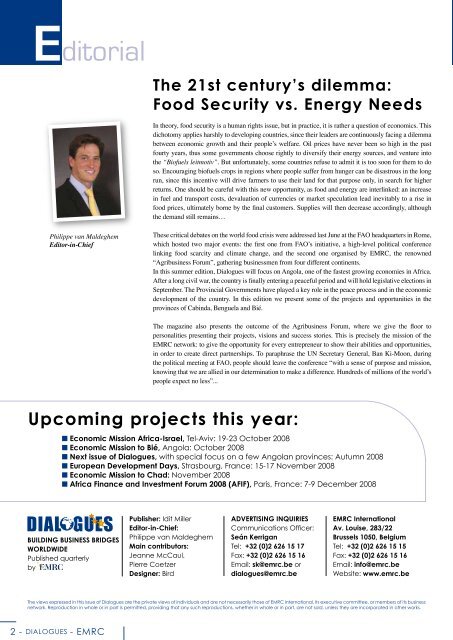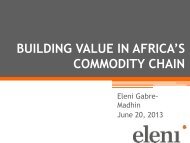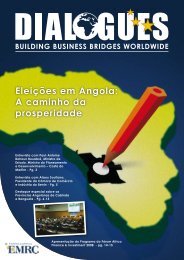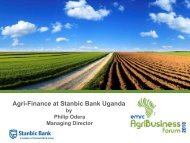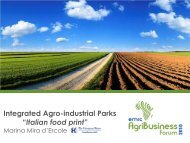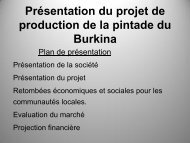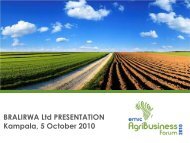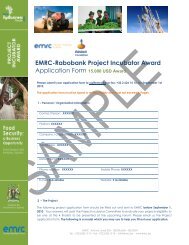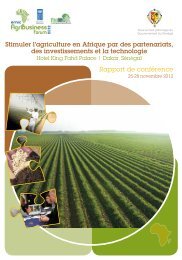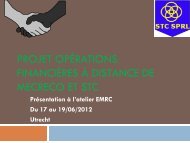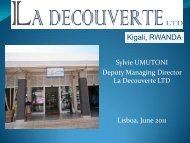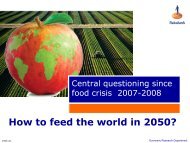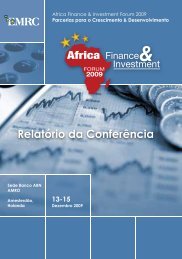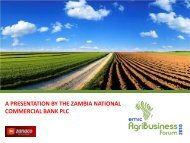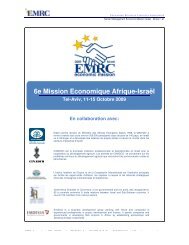Agro-Food Industry as Engine for Growth and Wealth - EMRC
Agro-Food Industry as Engine for Growth and Wealth - EMRC
Agro-Food Industry as Engine for Growth and Wealth - EMRC
You also want an ePaper? Increase the reach of your titles
YUMPU automatically turns print PDFs into web optimized ePapers that Google loves.
Editorial<br />
Philippe van Maldeghem<br />
Editor-in-Chief<br />
The 21st century’s dilemma:<br />
<strong>Food</strong> Security vs. Energy Needs<br />
Upcoming projects this year:<br />
- DIALOGUES - <strong>EMRC</strong><br />
■ Economic Mission Africa-Israel, Tel-Aviv: 19-23 October 2008<br />
■ Economic Mission to Bié, Angola: October 2008<br />
■ Next issue of Dialogues, with special focus on a few Angolan provinces: Autumn 2008<br />
■ European Development Days, Str<strong>as</strong>bourg, France: 15-17 November 2008<br />
■ Economic Mission to Chad: November 2008<br />
■ Africa Finance <strong>and</strong> Investment Forum 2008 (AFIF), Paris, France: 7-9 December 2008<br />
Building business bridges<br />
worldwide<br />
Published quarterly<br />
by<br />
In theory, food security is a human rights issue, but in practice, it is rather a question of economics. This<br />
dichotomy applies harshly to developing countries, since their leaders are continuously facing a dilemma<br />
between economic growth <strong>and</strong> their people’s welfare. Oil prices have never been so high in the p<strong>as</strong>t<br />
fourty years, thus some governments choose rightly to diversify their energy sources, <strong>and</strong> venture into<br />
the “Biofuels leitmotiv”. But un<strong>for</strong>tunately, some countries refuse to admit it is too soon <strong>for</strong> them to do<br />
so. Encouraging biofuels crops in regions where people suffer from hunger can be dis<strong>as</strong>trous in the long<br />
run, since this incentive will drive farmers to use their l<strong>and</strong> <strong>for</strong> that purpose only, in search <strong>for</strong> higher<br />
returns. One should be careful with this new opportunity, <strong>as</strong> food <strong>and</strong> energy are interlinked: an incre<strong>as</strong>e<br />
in fuel <strong>and</strong> transport costs, devaluation of currencies or market speculation lead inevitably to a rise in<br />
food prices, ultimately borne by the final customers. Supplies will then decre<strong>as</strong>e accordingly, although<br />
the dem<strong>and</strong> still remains…<br />
These critical debates on the world food crisis were addressed l<strong>as</strong>t June at the FAO headquarters in Rome,<br />
which hosted two major events: the first one from FAO’s initiative, a high-level political conference<br />
linking food scarcity <strong>and</strong> climate change, <strong>and</strong> the second one organised by <strong>EMRC</strong>, the renowned<br />
“Agribusiness Forum”, gathering businessmen from four different continents.<br />
In this summer edition, Dialogues will focus on Angola, one of the f<strong>as</strong>test growing economies in Africa.<br />
After a long civil war, the country is finally entering a peaceful period <strong>and</strong> will hold legislative elections in<br />
September. The Provincial Governments have played a key role in the peace process <strong>and</strong> in the economic<br />
development of the country. In this edition we present some of the projects <strong>and</strong> opportunities in the<br />
provinces of Cabinda, Benguela <strong>and</strong> Bié.<br />
The magazine also presents the outcome of the Agribusiness Forum, where we give the floor to<br />
personalities presenting their projects, visions <strong>and</strong> success stories. This is precisely the mission of the<br />
<strong>EMRC</strong> network: to give the opportunity <strong>for</strong> every entrepreneur to show their abilities <strong>and</strong> opportunities,<br />
in order to create direct partnerships. To paraphr<strong>as</strong>e the UN Secretary General, Ban Ki-Moon, during<br />
the political meeting at FAO, people should leave the conference “with a sense of purpose <strong>and</strong> mission,<br />
knowing that we are allied in our determination to make a difference. Hundreds of millions of the world’s<br />
people expect no less”...<br />
Publisher: Idit Miller<br />
Editor-in-Chief:<br />
Philippe van Maldeghem<br />
Main contributors:<br />
Jeanne McCaul,<br />
Pierre Coetzer<br />
Designer: Bird<br />
ADVERTISING INQUIRIES<br />
Communications Officer:<br />
Seán Kerrigan<br />
Tel: +32 (0)2 626 15 17<br />
Fax: +32 (0)2 626 15 16<br />
Email: sk@emrc.be or<br />
dialogues@emrc.be<br />
<strong>EMRC</strong> International<br />
Av. Louise, 283/22<br />
Brussels 1050, Belgium<br />
Tel: +32 (0)2 626 15 15<br />
Fax: +32 (0)2 626 15 16<br />
Email: info@emrc.be<br />
Website: www.emrc.be<br />
The views expressed in this issue of Dialogues are the private views of individuals <strong>and</strong> are not necessarily those of <strong>EMRC</strong> International, its executive committee, or members of its business<br />
network. Reproduction in whole or in part is permitted, providing that any such reproductions, whether in whole or in part, are not sold, unless they are incorporated in other works.<br />
I nterview<br />
Franz Fischler<br />
Former European Commissioner (1995-2004)<br />
successively <strong>for</strong> Agriculture <strong>and</strong> Fisheries<br />
“<strong>EMRC</strong>’s <strong>for</strong>um is precisely a way to stimulate<br />
the entrepreneurial behaviour in Africa.”<br />
■ Dialogues: Given your expertise, what<br />
is your <strong>as</strong>sessment of the subsidies given to<br />
EU farmers, which are perceived by African<br />
farmers <strong>as</strong> preventing them from competing<br />
at a fair price?<br />
Franz Fischler: Firstly, a lot depends on the<br />
type of subsidies <strong>and</strong> the way they are given to<br />
the farmers. The problem is that the European<br />
Union h<strong>as</strong> been used to giving, in the p<strong>as</strong>t, exports<br />
subsidies, which means that the prices<br />
on exports get reduced, in order to become<br />
more competitive. Today it is a huge problem,<br />
<strong>and</strong> these practices must be discontinued. I<br />
personally cannot see this practice go further,<br />
<strong>and</strong> I notified all the WTO members,<br />
together with P<strong>as</strong>cal Lamy, current Director<br />
General of the World Trade Organization<br />
(WTO), saying that Europe is prepared<br />
to ph<strong>as</strong>e out all the subsidies on export. We<br />
expect others to follow our initiative.<br />
Secondly, the direct support given to the<br />
farmers depends on the way it is done by<br />
the EU. Following the EU’s re<strong>for</strong>m, support<br />
is given directly to the farmers, <strong>and</strong> there is<br />
no link anymore to the product or the production<br />
process. There<strong>for</strong>e, this type of support<br />
is not distorted by trade or competition. This<br />
is different from the way the US are supporting<br />
their farmers. Thus, by non-discriminating,<br />
we are ahead of the Americans’ practices.<br />
Then, what the EU h<strong>as</strong> also done is to give its<br />
support only under certain conditions; among<br />
the main ones, the farmers must fulfil higher<br />
environmental st<strong>and</strong>ards, higher animal welfare<br />
st<strong>and</strong>ards <strong>and</strong> higher nutritional st<strong>and</strong>ards<br />
compared to other parts of the world. This is<br />
the real justification.<br />
■ Dialogues: In your opinion, what<br />
me<strong>as</strong>ures can the European Commission put<br />
together to fight against import barriers from<br />
African countries?<br />
FF: Truly, international trade requires the use<br />
of certain minimal st<strong>and</strong>ards, <strong>as</strong> we cannot<br />
take the risk of importing dise<strong>as</strong>es. If they are<br />
not fulfilled, neither will you be allowed to<br />
export, nor will you find any market <strong>for</strong> your<br />
product. In my view, this is the area where the<br />
concept of “Aid <strong>for</strong> Trade” should take place,<br />
Rome, June 2008<br />
which w<strong>as</strong> propagated by Jozef Stiggitz. In<br />
other words, I think that the industrialized<br />
world must help the African countries, companies<br />
<strong>and</strong> farmers so that they become able to<br />
fulfil these minimal st<strong>and</strong>ards. There<strong>for</strong>e our<br />
st<strong>and</strong>ards must be improved, but we must help<br />
African farmers to implement them.<br />
Regarding trade barriers, it is a matter of<br />
fact that in the p<strong>as</strong>t, the EU st<strong>and</strong>ards were<br />
seen <strong>as</strong> a kind of “hidden” trade barrier, <strong>and</strong><br />
we must adapt them. The st<strong>and</strong>ards must<br />
be objective <strong>and</strong> the same <strong>for</strong> everybody.<br />
<strong>EMRC</strong>’s network <strong>for</strong>ums<br />
help public <strong>and</strong> private actors to<br />
think differently, <strong>and</strong> take action<br />
<strong>for</strong> themselves locally.<br />
In addition to that, African countries must reflect<br />
upon the ways that they implement their<br />
own rules: very often, there is a blockage in<br />
trade between African countries. We have<br />
only been recently aware of the fact that when<br />
countries introduce “export taxes” or “restrictions<br />
<strong>for</strong> imports”, at the end, these me<strong>as</strong>ures<br />
could become counter-productive since the<br />
purpose of offering a sustainable supply of<br />
food might not be met.<br />
■ Dialogues: The supply of food is currently<br />
a worldwide problem. <strong>EMRC</strong>’s AgriBusiness<br />
Forum in the FAO headquarters comes in<br />
line with the FAO <strong>Food</strong> Crisis summit held at<br />
the beginning of June in the same premises.<br />
Since <strong>EMRC</strong>’s <strong>for</strong>um puts businessmen <strong>and</strong><br />
thinkers together, what should be achieved<br />
in order to diminish the impact of this food<br />
crisis?<br />
FF: There is a difference between the way we<br />
h<strong>and</strong>le the present food crisis <strong>and</strong> what should<br />
be done in order to reduce the risk of a new<br />
crisis in the future. On the one h<strong>and</strong>, about the<br />
present crisis, the immediate reaction should<br />
be to incre<strong>as</strong>e the amount of money supplied<br />
by industrialized countries to the UN food<br />
programmes, since they directly fight against<br />
the incre<strong>as</strong>ing number of malnutrition<br />
c<strong>as</strong>es. On the other h<strong>and</strong>, the prospects<br />
<strong>for</strong> the future are much more complex. Concepts<br />
such <strong>as</strong> “one feeds all” don’t work in<br />
practice <strong>and</strong> cannot be adapted to any given<br />
situation. Tools are often not adapted to their<br />
specific weather conditions, <strong>and</strong> we should<br />
invest in the sectors of research <strong>and</strong> development.<br />
People should realize that Agriculture<br />
h<strong>as</strong> become a “know-how intensive” business.<br />
Another tool to prevent the crisis should be<br />
to incre<strong>as</strong>e networking co-operation; in other<br />
words, develop partnerships between private<br />
actors in the food supply chain, between<br />
both continents, so they can learn from each<br />
other. <strong>EMRC</strong>’s <strong>for</strong>um is precisely a way to<br />
stimulate the entrepreneurial behaviour in<br />
Africa. Besides, a new type of co-operation<br />
between private <strong>and</strong> public sectors must be<br />
found, following the example of the EU<br />
“twinning projects” developed towards its<br />
new member states.<br />
But in general, we should think about ways<br />
to incre<strong>as</strong>e our financial aid, <strong>and</strong> we could<br />
consider three approaches: First, the industrialized<br />
countries should fulfil their promise<br />
of allowing 0,7% of their GDP to aid <strong>and</strong> development.<br />
Second, we should try to reduce<br />
the risk of a bursting bubble created by the<br />
speculation on commodities, by introducing a<br />
“capital transition tax” on these operations.<br />
Third, we should establish an international<br />
trading system <strong>for</strong> CO 2<br />
certificates.<br />
Developing countries, which pollute less,<br />
could sell their rights on CO 2<br />
emissions to<br />
industrialized countries, allowing them to use<br />
such money <strong>for</strong> their own development. This<br />
is an innovative way to meet two objectives<br />
at once.<br />
In conclusion, we should stop all discussions<br />
about charity to the developing world, <strong>and</strong><br />
start talking about justice. We have to develop<br />
a new mentality, <strong>and</strong> <strong>EMRC</strong>’s network <strong>for</strong>ums<br />
are positive in the sense that they help public<br />
<strong>and</strong> private actors to think differently, <strong>and</strong><br />
take action <strong>for</strong> themselves locally. We must<br />
contribute to help the developing countries get<br />
the opportunity to speak out <strong>and</strong> participate in<br />
the international market economy. ■<br />
Quarterly - Summer 2008 -


